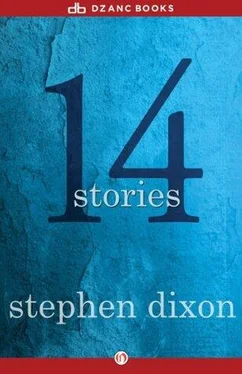Stephen Dixon - 14 Stories
Здесь есть возможность читать онлайн «Stephen Dixon - 14 Stories» весь текст электронной книги совершенно бесплатно (целиком полную версию без сокращений). В некоторых случаях можно слушать аудио, скачать через торрент в формате fb2 и присутствует краткое содержание. Год выпуска: 2013, Издательство: Dzanc Books, Жанр: Современная проза, на английском языке. Описание произведения, (предисловие) а так же отзывы посетителей доступны на портале библиотеки ЛибКат.
- Название:14 Stories
- Автор:
- Издательство:Dzanc Books
- Жанр:
- Год:2013
- ISBN:нет данных
- Рейтинг книги:5 / 5. Голосов: 1
-
Избранное:Добавить в избранное
- Отзывы:
-
Ваша оценка:
- 100
- 1
- 2
- 3
- 4
- 5
14 Stories: краткое содержание, описание и аннотация
Предлагаем к чтению аннотацию, описание, краткое содержание или предисловие (зависит от того, что написал сам автор книги «14 Stories»). Если вы не нашли необходимую информацию о книге — напишите в комментариях, мы постараемся отыскать её.
14 Stories — читать онлайн бесплатно полную книгу (весь текст) целиком
Ниже представлен текст книги, разбитый по страницам. Система сохранения места последней прочитанной страницы, позволяет с удобством читать онлайн бесплатно книгу «14 Stories», без необходимости каждый раз заново искать на чём Вы остановились. Поставьте закладку, и сможете в любой момент перейти на страницу, на которой закончили чтение.
Интервал:
Закладка:
Driving to the restaurant at 30 mph over the national speed limit and about 70 mph more than her tipsiness could seem to control, Sarah says” Ike didn’t come mostly because he went out for the job too. They wouldn’t consider him because he had little theatrical experience except for his Ph.D. orals and the defense of his dissertation on Beckett’s effect on the East Berlin years of Brecht, or was it the other way around, with Brecht on Beckett’s German poems? But there’s some execrable state law where it has to be a professional like you and preferably someone outside the school or we don’t get those particular funds. Kind of makes me bitter, for we need the money and it’d be fun working with that shiftless slob for once, but no hard feelings, you hear?” and she turns to me for an answer and we narrowly miss a cow as we plow through the first row of a front-lawn cornfield.
The dinner talk is mostly about rifles, shotguns, the upcoming hunting season when most of the men expect to fly north and bag a couple of moose, turkey shoots, do I shoot? “No? Then trap and fish? Then what do you expect to do around here weekends if you get the job?” And movies. Quality of acting in x-rated classics, which are all they get in the area. The greasy food we’re about to eat. “But great Bloody Marys,” someone says, “with two shots each in them of real commie vodka, and a celery twig instead of lemon slice, so you can get some roughage too.” Crime in New York. Death of the Broadway theater, rebirth of the regional. Where I’m originally from tor there’s an accent that’s not Manhattan, which a few of them say comes from London and almost everyone detects as not from New York. “North Carolina.” I lie. “So you’re down home like all of us, even if you been living in that cesspool for fifteen years.” Joan of Arc, Timon of Athens , and Cyrano de Bergerac , the three major Theater Arts Department productions this year that I’d be expected to help direct. “What are your ideas on Cyrano for instance? Would you portray him as a sympathetic impotent or a detestable sex-starved rogue or both? Do you think Rostand was influenced by Collodi’s Pinocchio , which if you didn’t know was written just fourteen years before Cyrano?” “Seventeen years,” someone says. “Fourteen.” “Seventeen.” “Let’s settle it,” Sarah says, “and call it an even dozen.” “Even two dozen,” the person who said “seventeen” says.
Gradually a couple of the teachers or their husbands or wives get drunk and have to wait in their cars for their spouses to finish dinner and in one case both get drunk together and leave while their desserts are being set aflame. “Put ours in two doggy bags,” the wife says before they go. Finally it’s just Sarah drinking more but getting soberer it seems, and the scenic and costumes design professor and his girlfriend, a Theater Arts Department senior who will be starring, he says, “in one of your three major plays this year including Cyrano or Timon in drag — that is, if you don’t positively mind.”
“Does that mean you know something I don’t, and maybe you do too,” I say to Sarah, “which is that I have the job?”
“Gordon was saying if, if, if. No final decision can be made till the vice president and English Department chairman and I get together the day after you leave.”
“Last winter,” the professor says, “for this flambé reminds me so much of it — remember, Sarah, the fireplaces we kept glowing for seventeen days straight? — we had a blizzard so tough, Mort, that it obliterated three people in this town alone. One of them this cuteas-can-be young history and marital team from the East who’d never seen such a snow and thought they had to experience it in the raw with a walk around their little street I don’t mean they went outside in the raw, for theoretically their habiliments on any other day or night, shall I say, would have availed.”
That night I can’t sleep much because of the drinks or spicy food and the beer parties going on in the surrounding rooms and floors. Next day I conduct a directing class and acting seminar, both with the Theater Arts Department staff watching and commenting—“I disagree with Mort’s interpretation of that walk-on.” “I agree.” “I don’t.” “You don’t disagree with Mr. Silk’s interpretation of the walk-on or you agree with Chuck and Faith?” “Excuse me, Professor Bien, but when I said I agree I didn’t mean I agree with Chuck but with Mr. Silk”—and after lunch I’m interviewed by the English Department chairman who tells me he’s been to New York City twice, both times to read papers at an MLA convention and also to see some shows. I ask what the letters MLA stand for and he says “I’ll skip that remark as either being indirectly pointed or too tempting for me to respond to in the cynical rather snotty way I dislike in everyone, including myself.”
“Wait, I don’t want to be misconstrued, especially by you. I suppose the last letter stands for Association, or possibly Academy, but I was sincere when I said I didn’t know.”
“I’ll accept that, sir.”
I’m next interviewed by the college’s vice president who holds open a thick folder with my name on it, and which has letters of recommendation and my correspondence with Sarah sticking out of it, and she says “You haven’t applied for too many college jobs, have you? Though I suspect all serious people in the arts, because of what should we call it? The emotional pressures of their work and the different sort of acquaintanceships they make over the years — have to be somewhat bizarre by nature and innovative in the social ways to just get on with it, as our students say, now isn’t that so?”
“I never thought there was anything that unusual about our behavior or that our pressures or the people we meet differed from any other line of work, except for a little something here or there which every profession has peculiar to its own, but you’re probably right.”
Later Sarah says the Theater Arts and English department faculties would love for me to give an informal reading of my favorite monologues from plays. “We have an excellent library for a college this size, and it is kind of expected of you I’m afraid.”
The reading went so well, she tells me over dinner at the same restaurant of last night, “that the two departments would like to jointly sponsor a reading in the main auditorium tomorrow afternoon for the entire school and nearby communities to enjoy.” A modest admission price is charged at the door and enough money is made, she later says, “to sponsor several free poetry and play readings by lesser-known performers during the year, and even pay them a fee. We’re all very grateful to you, and it certainly didn’t diminish your chances in securing the job.”
“Does that mean I have it?”
“Do you live alone?”
“I have my own apartment.”
“Then I suggest you start thinking about getting a sublessee.”
Sarah can’t find anyone to drive me to the airport. Ike was supposed to but he disappeared into the woods behind their house with his hounds and quiver and bow and enough food for three days, and she, because of ecological reasons that she suddenly decided on after a bad dream last night, no longer drives a car. I phone the young woman who asked for my autograph after the reading last night and who said if there was anything she can do for me short of driving me to New York, please let her know.
“If you only called five minutes earlier,” she says. “But now I’m in bed with a sick friend.”
I take the bus to Fargo, which stops at about a hundred towns along the way, one for a half-hour food and rest break. In Minneapolis I miss the last plane to New York and can’t make any connections till early morning, so I sleep the night in the airport lounge.
Читать дальшеИнтервал:
Закладка:
Похожие книги на «14 Stories»
Представляем Вашему вниманию похожие книги на «14 Stories» списком для выбора. Мы отобрали схожую по названию и смыслу литературу в надежде предоставить читателям больше вариантов отыскать новые, интересные, ещё непрочитанные произведения.
Обсуждение, отзывы о книге «14 Stories» и просто собственные мнения читателей. Оставьте ваши комментарии, напишите, что Вы думаете о произведении, его смысле или главных героях. Укажите что конкретно понравилось, а что нет, и почему Вы так считаете.












